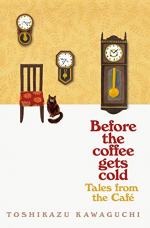
|
| Name: _________________________ | Period: ___________________ |
This test consists of 5 short answer questions, 10 short essay questions, and 1 (of 3) essay topics.
Short Answer Questions
1. What causes Gohtaro to panic when he first realizes he has returned to the past?
2. Who is Nagare?
3. What is an "onomatopoeic expression" (47)?
4. What lie does Gohtaro tell Shuichi about his reason for coming into the past?
5. Why does Nagare ask Gohtaro if something is wrong with his coffee?
Short Essay Questions
1. What details at the beginning of the story convey to the reader that Kyoto is a regular customer at the café?
2. What has fatherhood been like for Gohtaro?
3. When Gohtaro first sees Shuichi in the past, why does the gesture of putting his hand around his coffee cup cause Gohtaro to suddenly panic about his own ability to communicate?
4. Before Gohtaro goes into the past, what is his plan to deal with the revelations that will occur upon Haruka's marriage?
5. Describe the atmosphere of the time-traveling café.
6. When Shuichi tells Haruka in his message, "If it is for you, I can do anything," what does this foreshadow (36)?
7. How did Kyoko end up becoming a regular at the café, and why does her son not come with her anymore?
8. Why does the narrator use vague language to describe the tears falling during the encounter between Shuichi and Gohtaro?
9. Why does Kazu sound stern when she tells Gohtaro, "You know that even if your return to the past, reality won't change, right?" (13)?
10. What rule of time traveling in the café does Gohtaro almost immediately break when he returns to the past, and who saves him from this error?
Essay Topics
Write an essay for ONE of the following topics:
Essay Topic 1
What figurative meaning is there in the text's advice to drink the coffee before it gets cold? How is this figurative meaning supported by the descriptive passages about the origins, taste, preparation, and serving of the coffee? What does it mean that the people drinking it are customers in a timeless and somewhat magical café, not just people drinking coffee that they made in their own homes? What other details and language in the text support the idea that the coffee is symbolic? Write an essay that analyzes the symbolic significance of coffee in Tales from the Café. Support your assertions with evidence drawn from throughout the text, and be sure to cite any quoted evidence in MLA format.
Essay Topic 2
In a text that focuses on the hopes and desires of different characters who come and go over the course of several separate stories, what is important about having Kazu's situation also reflect key thematic motifs? Which of the thematic motifs in Tales from the Café does Kazu's life story amplify? How does Kawaguchi encourage the reader to care about Kazu and whether she finds happiness? Write an essay that discusses the importance of Kazu as a consistent central figure in Tales from the Café and analyzes the techniques that Kawaguchi uses to make Kazu's happiness significant to the reader. Support your assertions with evidence drawn from throughout the text, and be sure to cite any quoted evidence in MLA format.
Essay Topic 3
The motif of parental stand-ins begins in the story "Best Friends" with Gohtaro's adoption of his friend's orphaned child and with the parallel scenes between Miki and the younger version of Kazu. Later in the text, the reader learns about the relationship that developed between Kinuyo and Kazu after Kaname's death. What is Tales from the Café saying about stand-in and adoptive parents? Consider all three of these relationships--Gohtaro's with Haruka, Kazu's with Miki, and Kinuyo's with Kazu--as you write an essay analyzing the text's messages about parental relationships not through blood, but through choice. Support your assertions with evidence drawn from throughout the text, and be sure to cite any quoted evidence in MLA format.
|
This section contains 1,382 words (approx. 5 pages at 300 words per page) |

|




